MODULE 1
BASIC SKILLS
INTRODUCTION

When you meet someone
for the first time, it is very polite to introduce yourself to them. It depends
on the situation to what extend you introduce yourself, but you will always
tell someone your name.
Sometimes you will also have to give them some other details where numbers will be very important. Think of phone numbers, dates of birth, etc.
This is what we will be working on in this first module.
We will also spend some time on reading, listening, telephoning, and making appointments. These last two are very important when you go on an internship or during your work.
INTRODUCING YOURSELF:
Meeting people- iemand begroeten:
Hello/hi/hey informeel
Good morning goedemorgen
Good afternoon goedemiddag
Good evening goede avond
SPELLING


EXERCISE 1:
Listen to the words and names being spelled and write down the correct answers.
1. 6.
2. 7.
3. 8.
4. 9.
5. 10.
Now try spelling your own name and the name of your classmate. Do you understand what they are saying?
EXERCISE 2:
Write down the correct matches.
Match the correct number to the correct letter.
"This procedure is needed when you have a small hole in your tooth caused by decay."
-
"This is a regular visit to check your teeth and gums, usually every 6 months."
-
"This is a treatment to clean the teeth thoroughly, removing plaque and tartar."
-
"This is an urgent visit when you are in a lot of pain or have a broken tooth."
A. Dental Cleaning
B. Check-up
C. Emergency Appointment
D. Filling
YEARS/DATES/MONTHS
YEARS:
- je schrijft: 5 October 2010
- je zegt: the fifth of October, two thousand and ten
Uitspraak van jaartallen:
- 1806 – eighteen hundred and six
- 1978 – nineteen seventy-eight OR nineteen hundred and seventy-eight
- 1999 – nineteen ninety-nine OR nineteen hundred and ninety-nine
- 2008 – two thousand and eight
- 2015 – two thousand and fifteen OR twenty fifteen
- 2023 – two thousand and twenty-three OR twenty twenty-three
EXERCISES 5 & 6
Write the following numbers/dates in English:
1. 732 4. 2003 7. 1978
2. 1066 5. 1900 8. 2010
3 1492 6. 1889 9. 1939
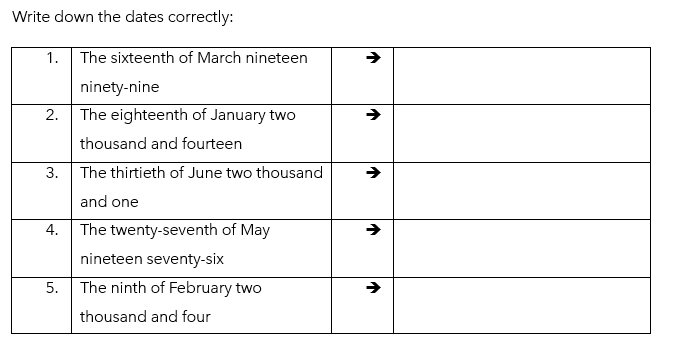
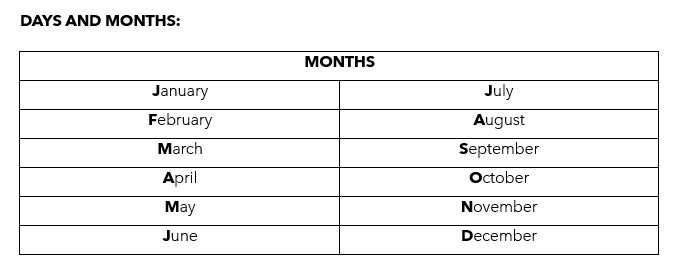
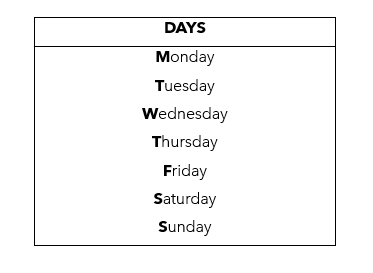
VOCABULARY


NUMBERS
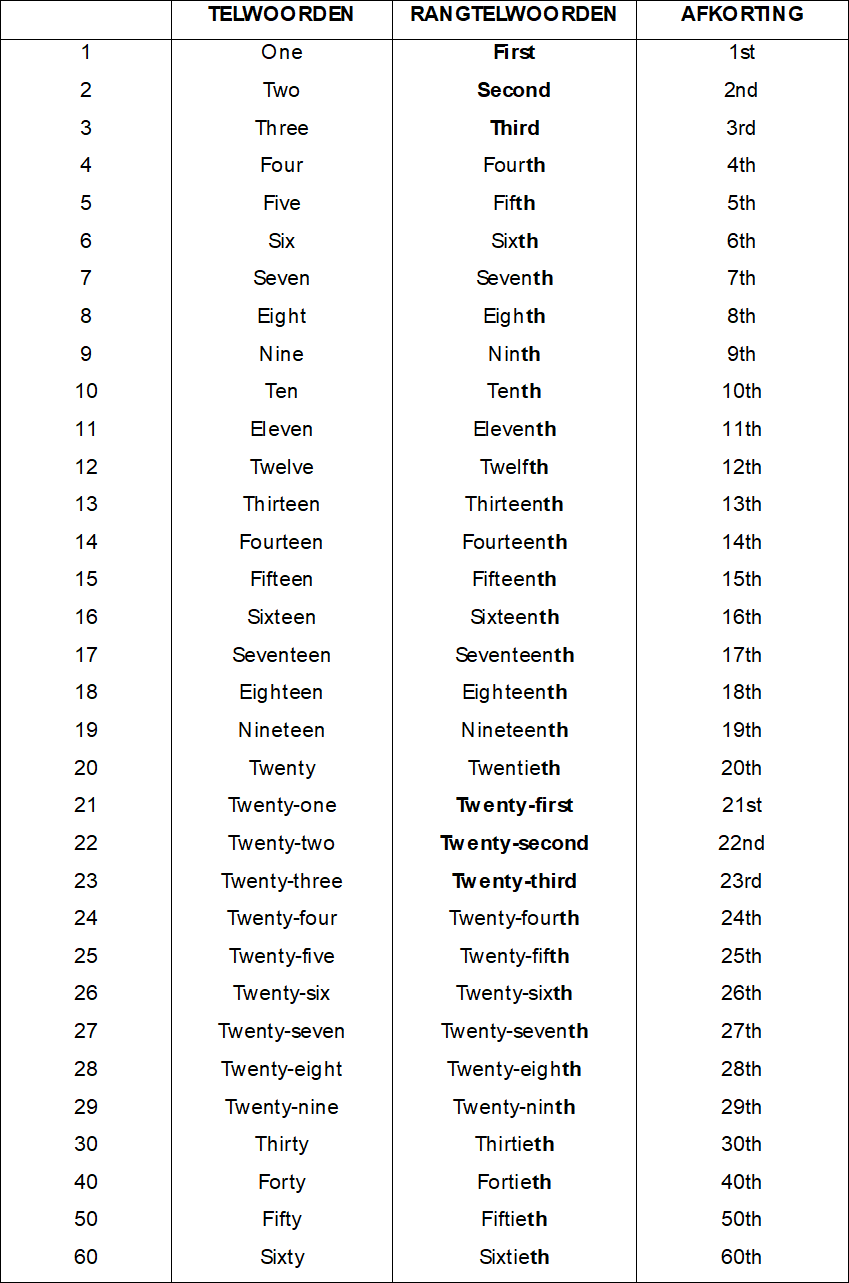
PRONUNCIATION (uitspraak):
- 110 = one hundred and ten
- 1250 = one thousand, two hundred and fifty
- 2,300 = two thousand, three hundred
- 204,000 = two hundred and four thousand
EXERCISES 3 & 4
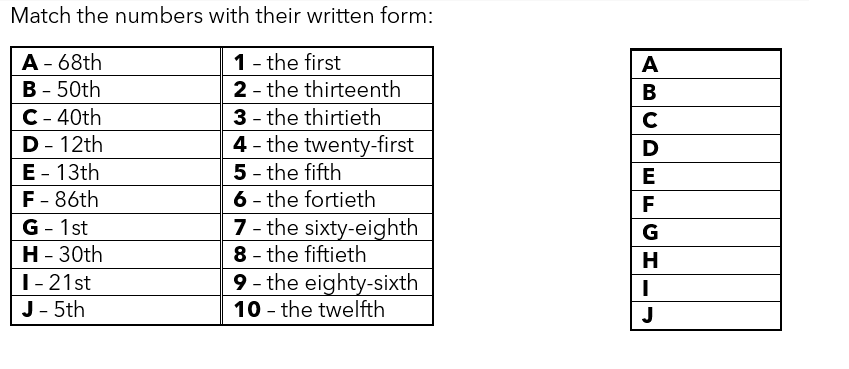

EXERCISE 7:
Translate the following words:
1. Morgen =
2. Gisteren =
3. Volgend jaar =
4. Vanmorgen =
5. Vanmiddag =
6. Vanavond =
7. Morgenochtend =
8. Overmorgen =
9. Eergisteren =
10. Een week geleden =
11. Vandaag =
TIME
Als je wil weten hoe laat het is, vraag je:
- Excuse me what's the time, please?
- Could you tell me the time, please?
- Excuse me, do you know what time is it?
Telling the Times:
When expressing time in English, the 12-hour clock system is commonly used, along with "a.m." (ante meridiem) for morning hours and "p.m." (post meridiem) for afternoon and evening hours. For example: 9:00 a.m. (spoken as "nine o'clock in the morning") 3:30 p.m. (spoken as "three thirty in the afternoon")
In addition, English uses words like "half-past" to indicate 30 minutes past the hour, and "quarter past" or "quarter to" to indicate 15 minutes past or before the hour, respectively. For example: 2:30 p.m. (spoken as "two thirty in the afternoon" or "half-past two in the afternoon") 4:15 p.m. (spoken as "four fifteen in the afternoon" or "quarter past four in the afternoon") 6:45 a.m. (spoken as "six forty-five in the morning" or "quarter to seven in the morning")
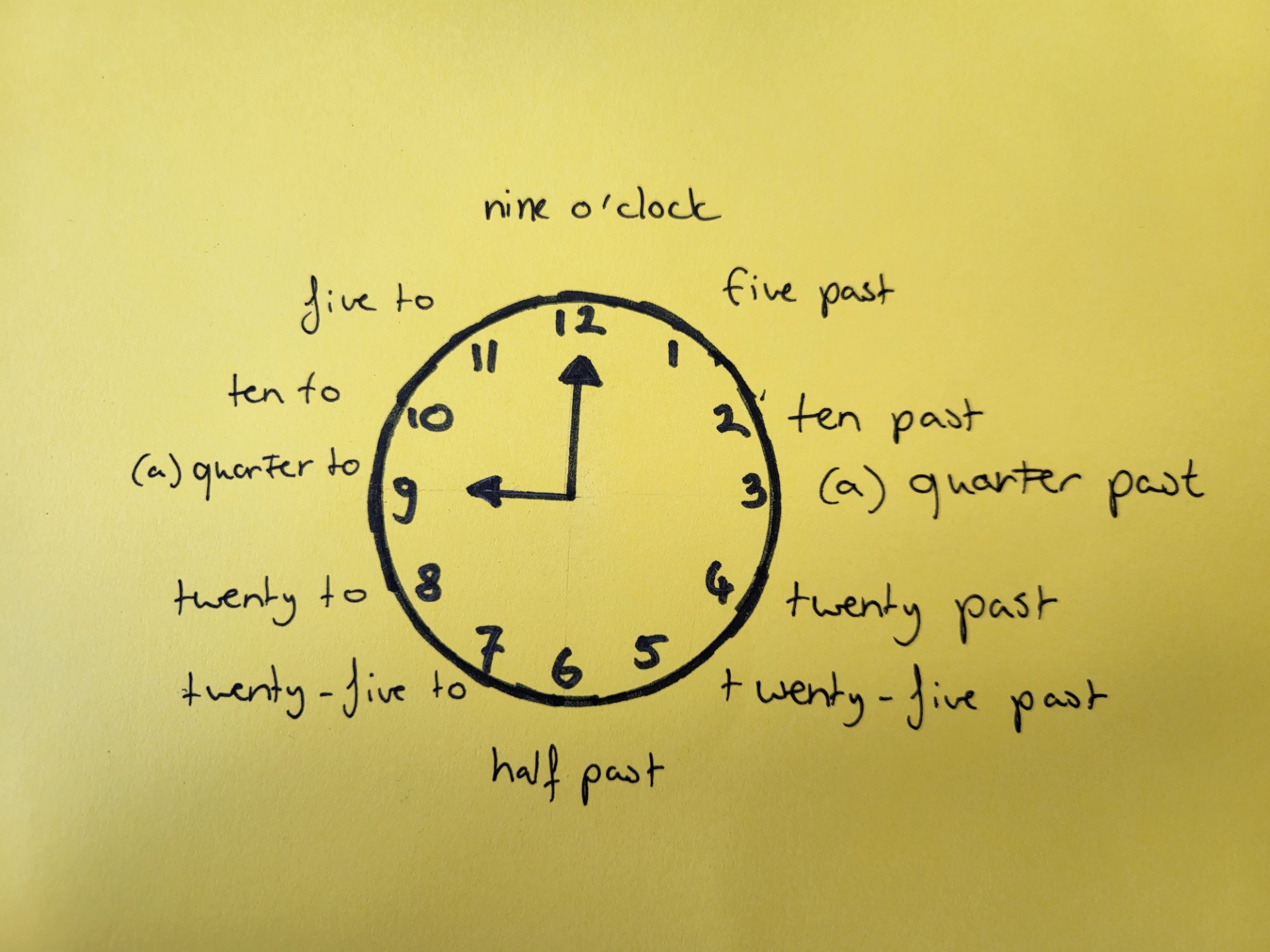
EXERCISE 8:
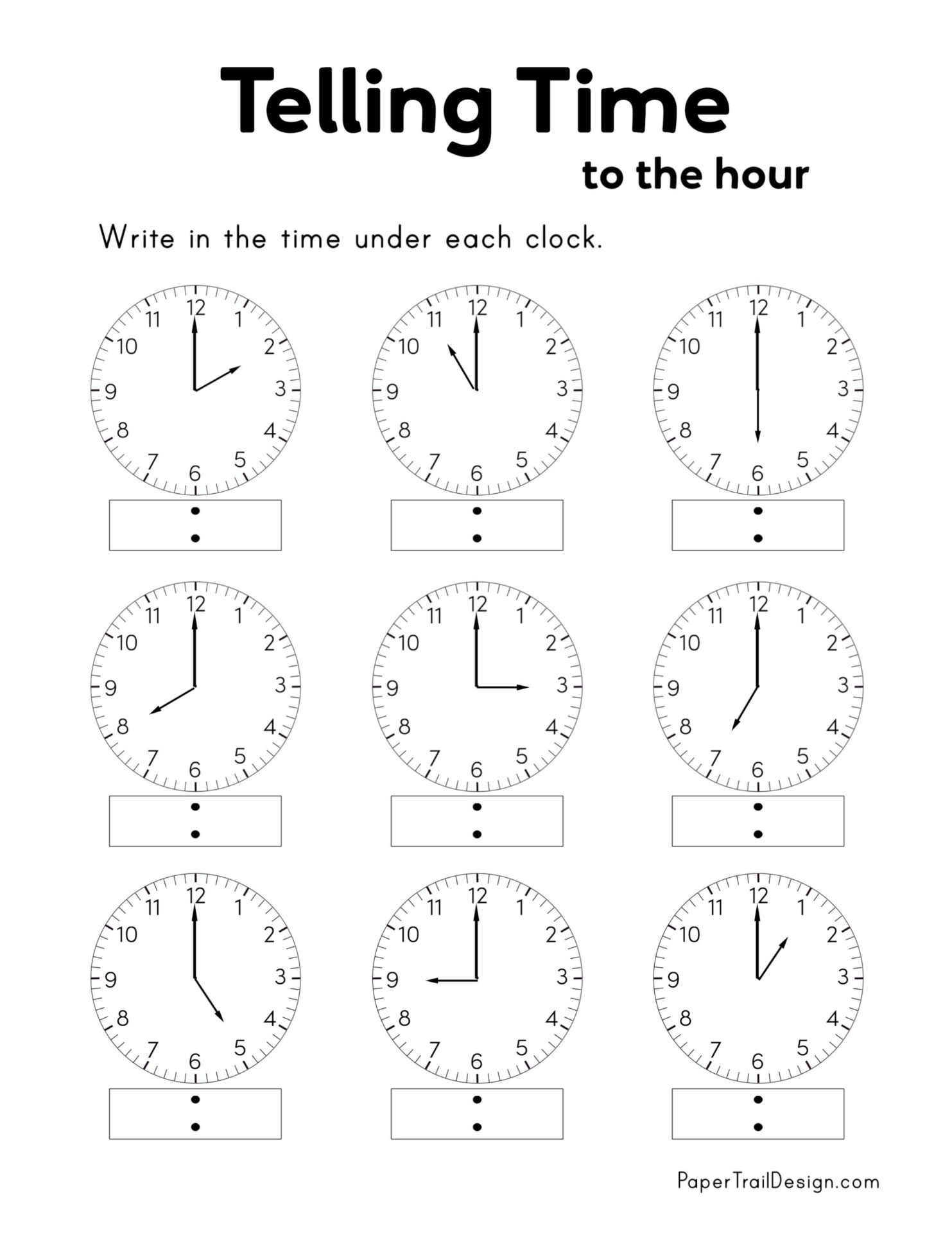
EXERCISE 9:
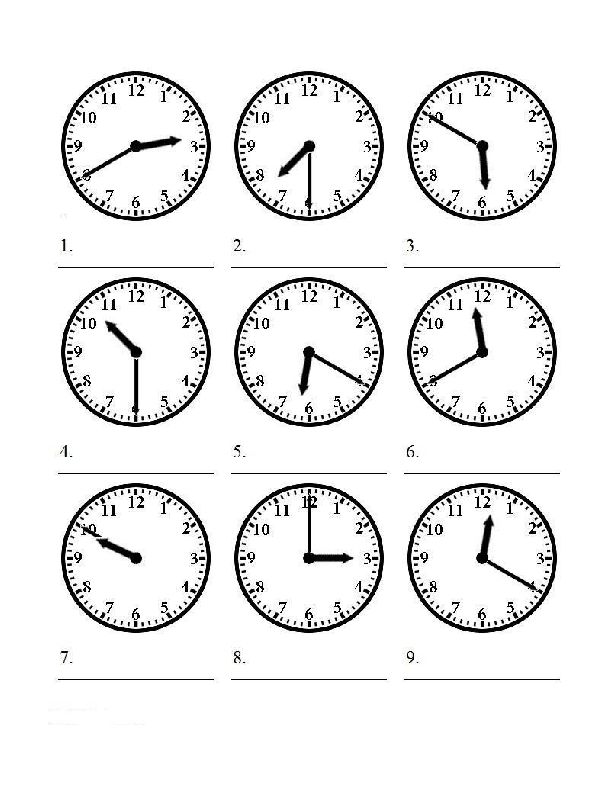
EXERCISE 10:
Translate the
following sentences:
1. Het is acht uur. =
2. Het is tien over half vijf. =
3. Het is kwart over zes. =
4. Het is tien voor twaalf. =
5. Het is tien voor half vier. =
6. Het is vijf over half zeven. =
7. Het is vijf voor half tien. =
8. Het is half negen. =
9. Het is tien over een. =
10. Het is kwart voor elf. =
CONVERSATIONS
Conversation between friends about going to the dentist.
Martha: Oh, I have a toothache!
George: It sounds like you're in for a visit to the dentist.
Martha: That would be the last resort! I hate going to the dentist. I
don't like needles and the sound of the drill scares me to death. I'm
hoping the toothache will just go away.
George: You really should get that checked out. Do you want me to make an
appointment for you with my dentist?
Martha: No, thanks. I haven't seen a dentist in years and I don't plan
to now unless I have no choice.
George: Years?! You haven't been to a dentist in years?? Haven't you
heard of preventive care? You're supposed to get a dental cleaning
twice a year.
Martha: I don't follow doctor and dentist guidelines like that. I brush
my teeth every day. That's good enough.
George: No, it's not. You should be flossing every day and rinsing
your mouth with mouthwash to keep your teeth and gums
healthy. If you haven't been to the dentist in years, I'm not surprised you
didn't know that.
Martha: Stop preaching! I'll go to do the dentist when I need to.
George: Like now..
Martha: Maybe. It doesn't hurt that much anymore.
George: yeah, right.
Conversation at the dentist
Dr. Chung: Hello Luis, I'm Dr. Chung. You're here for a check-up
and a cleaning, is that right?
Luis: Yes, that's right.
Dr. Chung: Okay, let's take a look. Have you had your wisdom teeth
taken out?
Luis: No, I haven't.
Dr. Chung: Hmm.., you may need to do that soon. You've had a root
canal?
Luis: Yes, about three years ago.
----
Dr. Chung: Does that hurt?
Luis: Ow!
Dr. Chung: I guess I hit a nerve. The bad news is that you may
need another root canal soon. Let's see if you have any cavities. Oh, I
think there's one here in your left molar. You'll need to come back for
a filling. Are you experiencing any sensitivity?
Luis: Yes, I am!
Dr. Chung: I'm not surprised. Your gums have receded and
some of the root is showing. Do you use dental floss?
Luis: Uhm, yes.
Dr. Chung: I'll have the dental hygienist show you how to brush
and floss better so you can prevent the buildup of plaque and tartar.
Any questions for me before the hygienist starts on your cleaning?
Luis: No, I'm just glad you didn't say I need dentures.
Dr. Chung: No, you don't. Not yet.
EXERCISE
Translate the following words:
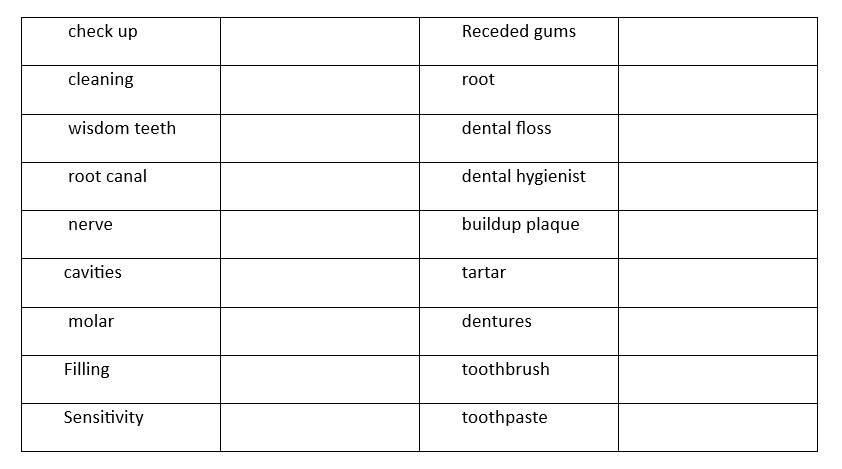
MAKING APPOINTMENTS
EXERCISE
Translate the
following sentences into English:
DA = Dental assistant
P = Patient
DA: Goedemorgen, Tandartspraktijk Jansen, dit is de tandartsassistent, hoe kan ik u helpen?
__________________________________________________________________________
P: Goedemorgen, ik zou graag een afspraak maken voor een
controle.
__________________________________________________________________________
DA: Dat doe ik graag voor u, bent u al eerder bij onze
praktijk geweest?
__________________________________________________________________________
P: Ja, mijn laatste controle was 6 maanden geleden.
__________________________________________________________________________
DA: Mooi, mag ik uw naam?
__________________________________________________________________________
P: Ja natuurlijk, mijn naam is… (eigen naam)
__________________________________________________________________________
DA: Dank u, (student naam), welke tandarts had je bij de
laatste afspraak?
__________________________________________________________________________
P: Dat weet ik niet zeker eigenlijk.
__________________________________________________________________________
DA: Dat is okay, ik zal even in uw gegevens kijken, ah
okay, tandarts Jansen.
__________________________________________________________________________
P: Ja, dat klopt.
__________________________________________________________________________
DA: Ok, tandarts Jansen heeft tijd op dinsdagochtend om
half 9.
__________________________________________________________________________
P: Hm, dat gaat niet. Ik moet werken. Zou het een week
later kunnen?
__________________________________________________________________________
DA: Tandarts Jansen heeft wel eens een opening, wilt u een
tijd voorstellen?
__________________________________________________________________________
P: Is er ergens een opening in de middag?
__________________________________________________________________________
DA: Ja het zou donderdagmiddag om 2:30 kunnen op 14
september.
__________________________________________________________________________
P: Fijn, dat kan!
__________________________________________________________________________
DA: OK. Bedankt voor het bellen, we zien u volgende week.
__________________________________________________________________________
P: Dank u, dag.
__________________________________________________________________________
EXERCISE:
Listening & Speaking – Handling a Late Patient
Situatie: Een patiënt belt in het Engels en zegt dat hij te laat zal zijn.
Instructie:
Werk in tweetallen. Één is de patiënt, de ander de assistent. Speel het telefoongesprek na.
Patiënt zegt bijvoorbeeld:
"Hi, this is James Adams. I'm running about 20 minutes late for my appointment at 2 PM. Will the dentist still be able to see me?"
Assistent reageert met:
-
Begrip tonen
-
Controleren of de afspraak verplaatst moet worden
-
Eventueel een alternatieve tijd voorstellen
Na het rollenspel, noteer het resultaat in een kort Engels verslag, bijv.:
"Mr. Adams called to inform us he will be late. New time: 2:30 PM, same day."
FINAL EXERCISE
Dit is de laatste opdracht van de periode. Voor het maken van de brochure krijg een cijfer (schrijfopdracht), daarna ga je deze presenteren aan de klas en hier krijg je ook een cijfer voor (spreekopdracht).